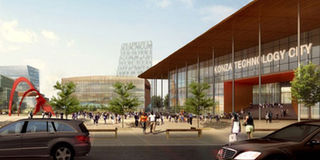Konza starts to take shape

An artist's impression of the Konza Techno City. The development of infrastructure at the planned Konza technology city has begun, with Kenya Power starting to lay power lines even as the future of the city looks shaky. PHOTO | FILE
What you need to know:
- There are fears firms could lose cash due to delays in setting up necessary infrastructure
The development of infrastructure at the planned Konza technology city has begun, with Kenya Power starting to lay power lines even as the future of the city looks shaky.
The electricity supplier on Tuesday started the initiative following the completion of a Sh28 million survey by the University of Nairobi.
Demarcated parcels
The study also set the stage for other utility firms and the Kenya Urban Roads Authority to begin work in Konza. Further, the university demarcated parcels of land that will be leased out to investors in the first phase of the project.
“We will use the survey to guide the layout of more infrastructure. Next, we are going to carry out due diligence on potential investors,” said Konza Technopolis Development Authority acting chief executive Catherine Adeya.
DATA CENTRE
Some 345 local and international companies have expressed interest in investing in the planned technopolis. According to Dr Adeya, Equity Bank has committed to construct a Sh3 billion data centre in Konza.
Nevertheless, the project is at risk of bleeding investors. Construction has been delayed by a year, with Dr Adeya saying this has had an adverse impact on investors.
Safaricom had planned to built an M-Pesa academy, which would nurture young entrepreneurs but has since relocated the project.
The mobile firm had hoped to enrol the first class by January 2015, but the authority was unable to provide concrete details on leasing plans or construction timelines.
In a statement, Safaricom said it would “await more clarity on how the project is progressing before making any further commitment.”
Some multinationals are also turning their focus to other African countries, such as Ghana, Rwanda, and Ethiopia, that have similar projects.





